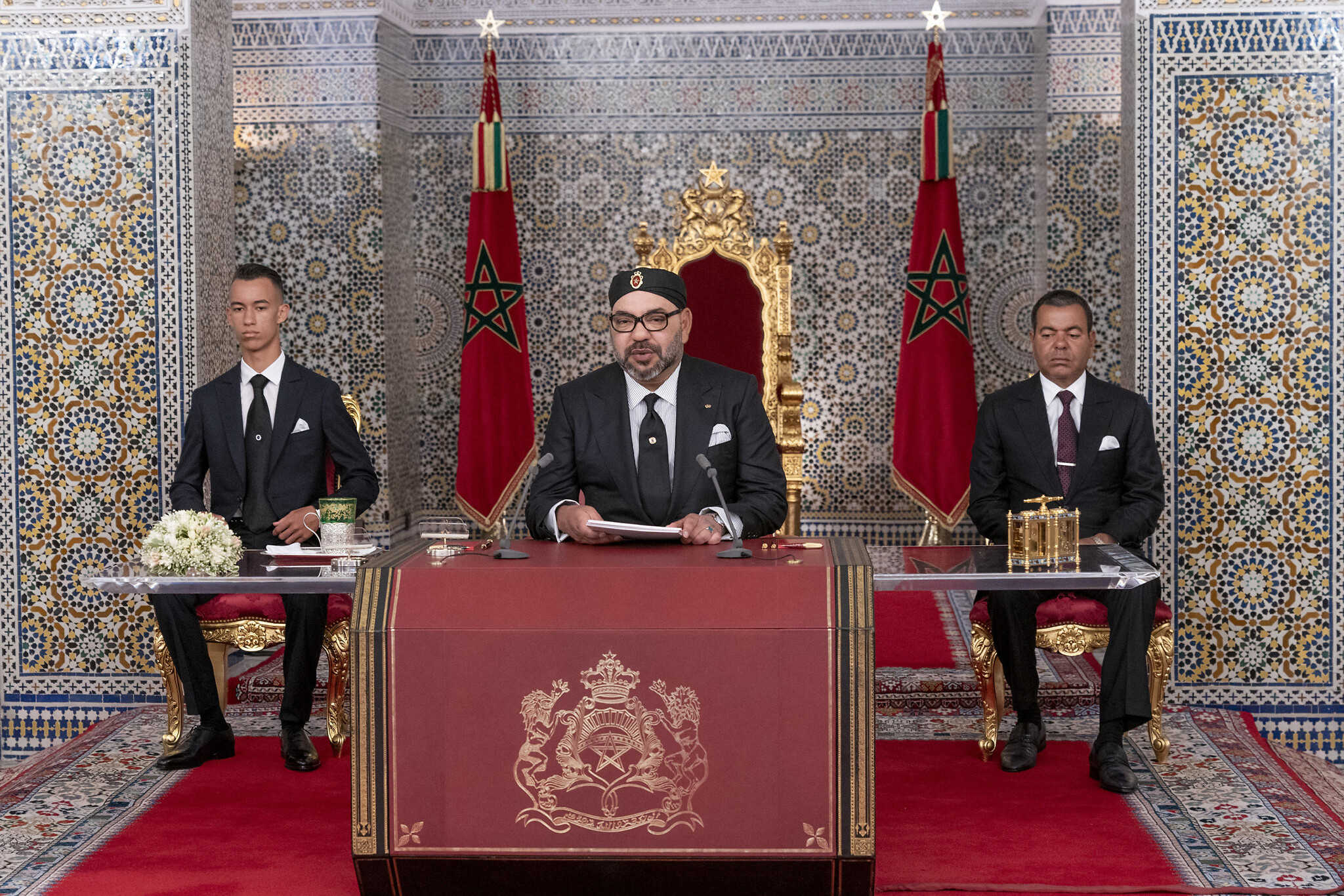
31 March 2022
In Honor of the King of Morocco, His Majesty King Mohammed VI, whose enlightened leadership—especially preserving & perpetuating the Judeo-Moroccan legacy as an integral part of the Moroccan identity, strengthening the connections between Muslims and Jews, and taking historic actions to advance peace—has distinguished the Kingdom of Morocco as a much-needed pluralist exception in a world beset by rising extremism. May the Almighty—in the words of Menasseh ben Israel, the Sephardic rabbi, diplomat, philosopher, publisher, and friend of Rembrandt—“bless and keep, preserve and rescue, exalt and magnify, and lift up higher and higher” the Amir Al-Mouminine (Commander of the Faithful)
Click here to dedicate a future issue in honor or memory of a loved one

The American Sephardi Federation’s Sephardi Ideas Monthly is a continuing series of essays and interviews from the rich, multi-dimensional world of Sephardi thought and culture that is delivered to your inbox every month.
The American Sephardi Federation joins the rest of Clal Yisrael and all people of conscience in mourning all those murdered recently in Israel by Islamists. This month’s issue of Sephardi Ideas Monthly shines a light on Muslims across the Middle East and North Africa who are refuting and courageously confronting Islamist barbarism.
This month’s issue of Sephardi Ideas Monthly inaugurates a new series exploring a very important cultural development in the Middle East and North Africa (MENA) that has been almost completely ignored by the Western Press. What’s the story?
A serious struggle is being waged by Islamic scholars from Morocco to the Gulf to cultivate and advance a tolerant form of Islam that respects non-Muslims and that recognizes minority rights based upon Islamic principles.
The efforts of Islamic scholars must of course be seen within larger political contexts. In the Middle East, religion and politics are rarely separable. Additionally, even if one identifies with these scholars’ aims, it’s possible to wonder about the effectiveness of scholarly-religious pronouncements and documents, in general. Different dimensions and critical perspectives will be examined in the course of the series.
But Sephardi Ideas Monthly respectfully submits that if you had been following the various forms of Islamic reform and their interaction with global Jewish communities over the past few years, meetings often spear-headed by the American Sephardi Federation, then you weren’t terribly surprised when the Kingdom of Bahrain and the United Arab Emirates established and the Kingdom of Morocco restored and upgraded diplomatic relations with the Jewish state in 2020. In order to understand political developments across MENA, it’s helpful to keep an eye on religious developments.
This month, we shine the spotlight on the “Marrakesh Declaration,” a pioneering attempt to ground minority rights in Islam published in 2016 in Morocco.
~~~~~~~

The ASF’s 24th New York Sephardic Jewish Film Festival
Moise Safra Center
3-7 April 2022
Click here for information, passes, and tickets
~~~~~~~
Dr. Susan Hayward from Harvard Divinity School attended the conference that produced the Marrakesh Declaration as an “interfaith clergy representative.” Her article, “Understanding and Extending the Marrakesh Declaration in Policy and Practice,” provides context and a very thoughtful summary and analysis.
Hayward begins by noting that “the path to Marrakesh” began in 2013 with a series of seminars organized in Mauritania at the behest of the “respected intellectual” Sheikh Abdullah bin Bayyah. That’s a name that you need to know if you want a tolerant, pluralist Middle East to emerge.
These seminars were held in response to the hatred and violence then plaguing the region. As the situation worsened, with ISIS re-instating human chattel slavery and unleashing a deluge of barbaric, perverse violence:
Sheikh bin Bayyah sought to convene a more global and visible forum to respond to the crisis in the Muslim world. The conference in Marrakesh was hosted by King Muhammad VI and was supported by the Moroccan government, which had participated in the earliest gatherings in Mauritania. The coorganizer was the United Arab Emirates (UAE)–based organization, the Forum for Promoting Peace in Muslim Societies, established by Sheikh bin Bayyah in 2014 under the patronage of Sheikh Abdullah bin Zayed, UAE’s current foreign minister.
In 2013 and 2014, Morocco and the UAE were already working to change the Islamic discourse in the Muslim world.
And in Marrakesh, in 2016, over 300 Muslim scholars, activists, and politicians came together to articulate a tolerant vision of Islam that can function as a constructive, humane force in a modern state. The result, “The Marrakesh Declaration,” is grounded in the belief that tolerance is deeply rooted in the Muslim past. To be more precise, Sheikh bin Bayyah, who Hayward credits with “crafting” the document,
…argues that in the modern world, as Muslim societies operate as ‘nation states’ and adopt international legal frameworks to govern relations within and between themselves, the Charter of Medina is the most appropriate model from Islamic tradition to guide relations in diverse societies.
The Charter of Medina is a 7th century document (or documents) from the time of the Prophet Muhammad that created a new ummah (“community”) in the city of Medina. As such, the Charter also regulated relations with the Jewish tribes then living in the city. Writes Hayward:
At the heart of the Declaration is the assertion of the essential relevance of the Charter of Medina as a model for contractual citizenship to ensure equal rights under the law for all, in keeping with international legal standards, and the call to Muslim scholars and authorities to use the Charter as the basis for developing contractual citizenship models in their national constitutions.
The result:
… is a remarkable set of documents that can be used to advance the understanding of Islamic history, Islamic theology and law, and international human rights norms. Efforts to integrate the Declaration’s contents into school and university curricula can be advanced to normalize its content, and to revive the Charter of Medina as a key source of authority… to determine proper Islamic treatment of minorities.
All that said, Hayward is aware that the Marrakesh Declaration is a document produced by scholarly elites that reflects a changing political trajectory and that enjoys the support of important political figures, but that has yet to impact the Arab masses. These are the masses who, in some places, have received an intolerant, Islamist education of one kind or another for generations.
What’s more, warns Hayward:
Non-Muslim states and organizations must play a supporting, rather than leading, role. The issue of minority rights is weighted with postcolonial resonance… Allegations of mistreatment of religious minorities were used as pretext to assert greater influence over local politics, and colonial rulers often gave preferential treatment to minority populations in a strategy of divide and rule.
Hayward’s sober and thoughtful article includes a copy of the Marrakesh Declaration itself, as well as the 7th century Charter of Medina.
It’s clear on which side the Jewish people stands in this battle. It was on display in Sde Boker at the beginning of the week as the foreign ministers of Israel, Morocco, the UAE, Bahrain, and Egypt, aka the “Anti Muslim-Brotherhood League,” hosted Anthony Blinken (Captain America?) in Israel’s southern Negev region. New Jewish communities are emerging in the UAE, the Bahraini Jewish community is ready to grow, and the traffic between Israel and Morocco will only increase. The Moroccans, it should be noted, are careful to distinguish their diplomatic agreement from the Abraham Accords because of the unique relationship that Morocco and Israel enjoy, based upon shared heritage and culture. This, too, will be part of the story.
Upcoming issues of Sephardi Ideas Monthly will include interviews with leading Middle Eastern intellectuals and religious figures, and investigations of fascinating and important developments on the ground. Sephardi Ideas Monthly is very happy to begin this important series with Susan Hayward’s, eye-opening and thought-provoking, “Understanding and Extending the Marrakesh Declaration in Policy and Practice.”
Click here to read the article “Understanding and Extending the Marrakesh Declaration in Policy and Practice”
~~~~~~~
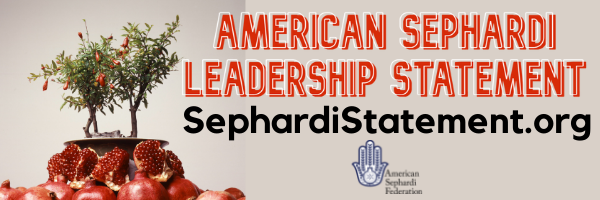
The American Sephardi Federation invites all individuals, communities, and organizations who share our vision & principles to join us in signing the American Sephardi Leadership Statement!
Please also support the ASF with a generous, tax-deductible contribution so we can continue to cultivate and advocate, preserve and promote, as well as educate and empower!
Make checks payable to “American Sephardi Federation” @ 15 West 16th Street, New York, NY, 10011.
Email us at info@americansephardi.org if you are interested in discussing donating securities or planned giving options with a financial professional from AllianceBernstein.
~~~~~~~
The Monthly Sage החכם החודשי

The sage for the month of March, 2022, is Hakham Sliman David Sassoon (1905-1985).
Born in London at the turn of the 20th century, young Sliman enjoyed a unique education. He was provided with private tutors at the home of his grandmother, Freicha Flora Sassoon, who was a scholar of Bible, Talmud, and Halacha, in her own right. Languages? Sliman spoke Arabic with his father and grandmother, German with his mother, and Hebrew or Yiddish with his tutors.
In 1924, Sliman visited the Land of Israel with his parents, where they met Hakham Bechor Quaknine. Hakham Quaknine returned with the family to London to serve as Sliman’s personal teacher from the Holy Land. In addition to his religious studies, Sliman studied mathematics and physiology and would read the latest scientific journals.
Hakham Sliman David Sassoon was ordained by Rabbi Samuel Yitzhak Hillman, the famous Rabbi Eliyahu Dessler and Hakham Shemtob Gaguine.
In 1939, Hakham Sliman and his father worked together to aid Jewish refugees who had reached England from Germany.
Hakham Sliman made Aliyah to Israel In 1971, and once there, worked to preserve the Babylonian Jewish heritage.
Hakham Sliman David Sassoon passed away on 7 Sivan 5745 (1985). He was buried in Jerusalem. A collection of his Torah commentary can be found in the book, Natan Hochma Le’Shlomo.
In the following “Conversation on Job,” from Natan Hochma Le’Shlomo, Hakham Sliman teaches that humans have been charged by God to combat wickedness and take responsibility for the earth:
‘Would you impugn My justice? Would you condemn Me that you may be right?’ God reveals to Job that the basis for all his claims is that he wishes to see himself innocent; he therefore makes claims against God: Why does God let the wicked succeed? Why does He not bring them to judgment? But Job does this, perhaps unwittingly, for a particular reason. He wishes to see God as responsible, and himself as innocent – as though he has no part in all these events. However, God does not consent. God tells him, I am not your servant that I should cleanse the world of wicked people so that you may live in peace, this is not my role. I placed people like you in this world so that they fight for justice and law. If you have so powerful a sense of law, integrity and justice, you are obliged to take action, and to not remain passive and shout why I don’t do anything… You are reversing the entire order of creation, this is not the order I created in my universe…I want people to be charitable and to do justice. I do not always wish to act directly. I provide people with the opportunity to take action, and if they do not, the wicked prosper, but human beings are those who are responsible for this. I want them to be responsible.
~~~~~~~
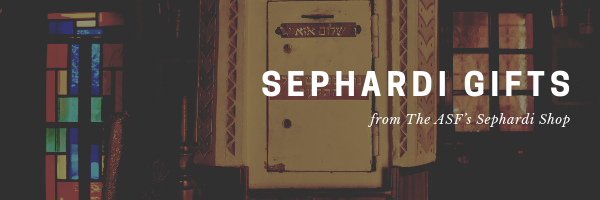
Our Story: The Jews of Sepharad; Celebrations and Stories
By Lea-Nora Kordova Annette and Eugene Labovitz
Celebrations and Stories, a special publication of the Coalition for the Advancement of Jewish Education with the American Sephardi Federation, is an essential work that enhances the teaching of Sephardi history, traditions, and cultures.
The life cycle and calendar sections are designed to horizontally connect to the teaching of customs and ceremonies from the Spanish & Portuguese, Syrian, Judeo-Spanish, and Moroccan traditions. Other sections include translations of classic texts and poetry, tales of our history’s heroes, and classroom activities.
Jewish Women from Muslim Societies Speak
Published by the American Sephardi Federation and Hadassah International Research Institute on Jewish Woman at Brandeis University
Jewish women from Morocco, Egypt, Turkey, Lebanon, and Iran were invited to share their personal stories. It could be said that these women’s voices are from the last generation of Jews to have an intimate personal knowledge of the Muslim world, the enormous diversity within and among Middle Eastern Jewish communities.
We hope that these essays, told through the medium of vivid personal stories, will stimulate discussion about contemporary dynamics in the Muslim world and raise awareness of Jewish women’s history in North Africa and the Middle-East.
~~~~~~~
Upcoming Events or Opportunities
The 24th New York Sephardic Jewish Film Festival
Five Days, Six Pomegranate Award Honorees, & Six Première Films!
Passes & Tickets | Lineup | Trailer | Sponsorship Opportunities

The New York Sephardic Jewish Film Festival (NYSJFF) returns this year, celebrating its 24th anniversary, with movie premières, award ceremonies, filmmaker Q&As, a fashion show with Elie Tahari, and live music!
This special edition, dedicated to Ike, Molly, & Steven Elias is being presented in partnership with and at the beautiful Moise Safra Center (130 E 82nd St) from 3-7 April 2022
ASF Pomegranate Award Honorees in attendance:
André Aciman (Lifetime Achievement Award for Literature)
The Marvelous Mrs. Maisel’s Caroline Aaron (Lifetime Achievement on Stage & Screen)
Lainie Kazan (Lifetime Achievement Award on Stage & Screen)
The Blacklist’s Amir Arison (Achievement Award for Acting)
Neta Elkayam (Achievement Award for Music)
Violeta Salama (Ronit Elkabetz, A”H Rising Star Director)
The Pomegranate Award—sculpted by Oded Halahmy, the world-renowned, Baghdad-born artist—recognizes extraordinary achievements in the arts. Past recipients include Tunisian-born French sociologist & giant of Sephardi literature Albert Memmi, Senior Counselor to the King of Morocco André Azoulay, French-Algerian recording legend Enrico Macias, filmmakers Lisa Azuelos, Zeva Oelbaum, and Elie Chouraqui, courageous Tunisian film producer Said Ben Said and Kuwaiti singer Ema Shah, fashion designer Elie Tahari, and legendary actors Ronit Elkabetz and Sasson Gabay.
Reserve Passes & Tickets on Eventbrite
(Includes Opening Night, Closing Night, All Screenings, Q&As, and After Parties):
$140/$200 (VIP Seating)
20% off for ASF Pomegranate Card Members
Members should email at info@americansephardi.com to get a discount code
Opening Night and Award Ceremony
$75/$100 (VIP Seating)
Opening Night – From Baghdad to Bollywood
SHALOM BOLLYWOOD
(Opening Night and Award Ceremony): $75/$100 (VIP Seating)
Persian-Israeli-American Fashion Night with Elie Tahari
THE UNITED STATES OF FASHION DESIGNER ELIE TAHARI
$50/$75 (VIP Seating)
Antisemitism in Focus
WET DOG
$25/$35 (VIP Seating)
Brooklyn Tango Night
TANGO SHALOM
$40/$50 (VIP Seating)
From Jerusalem to Tangier & Tinghir: Moroccan Closing Night
IN YOUR EYES, I SEE MY COUNTRY
$50/$75 (VIP Seating)
SINGLE SCREENING: $13/$15 (VIP Seating)
Discuss Sponsorship or Advertising: Yves@AmericanSephardi.org
Email Inquires: info@AmericanSephardi.org
===
The ASF Institute of Jewish Experience presents:
The Five Pillars of Islam – A Jewish Perspective
Rick Sopher will explain the so-called “Five Pillars of Islam” (declaration of faith, prayer, giving, fasting, and pilgrimage) and look at connections, similarities, and differences with Jewish Practise. He will explore the basis of these practises and how one might have influenced the other.
Bonus: Rick will also look at the basis of the very close practises of Jewish and Muslim dietary laws and explain the history of this connection, which was first stated explicitly in the Qur’an.
Monday, 4 April at 12:00PM EST
(Ticket: $10)
Sign-up Now!
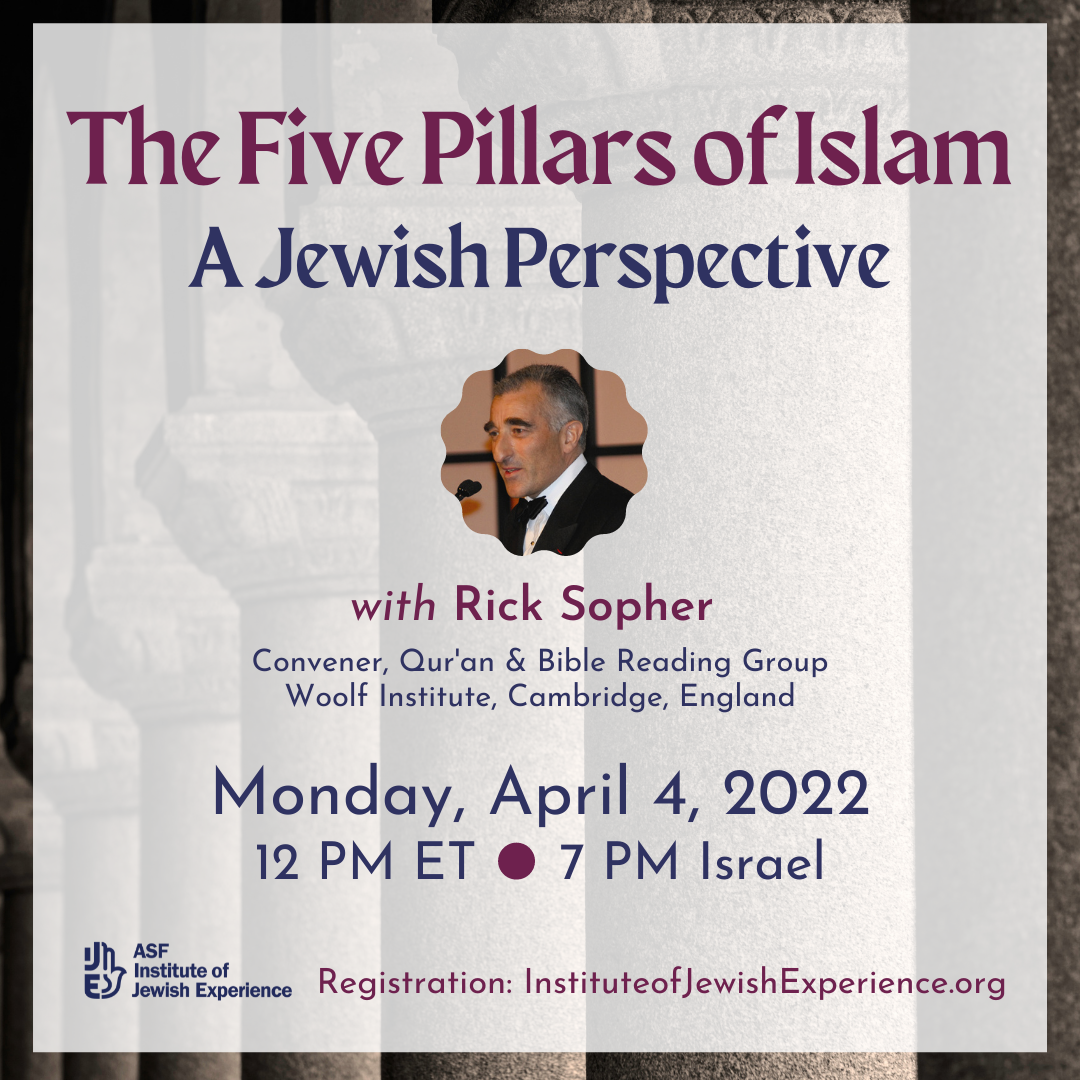
About the author:
Rick has a financial background and is the CEO of Edmond de Rothschild Capital Holdings, which he joined in 1993. He is the Chairman of the world’s longest established investment fund of its type. Prior to that he worked at BDO Stoy Hayward, where he was appointed the youngest ever partner. He has received various industry awards including the Outstanding Contribution Award from Hedge Fund Review and the Decade of Excellence Award by Financial News.
Rick graduated from Cambridge University and has more recently worked in the area of interfaith relations with the Woolf Institute, Cambridge as a member of their Council.
During the lockdown period, Rick convened an online dialogue between Professors of Religion at the world’s leading universities to discuss the relationship between the Qur’an and the Bible and has himself dialogued with Muslim leaders on the subject.
Rick was awarded the Chevalier de la Legion d’Honneur in 2007 from President Chirac for his contribution to religious education in France and is Chairman or Director of several educational charities in the UK.
Sponsorship opportunities available:
info@americansephardi.org
===
The ASF Institute of Jewish Experience presents:
New Works Wednesday with Mark Schneegurt
Join us for this episode of New Works Wednesday where Mark Schneergurt discusses “Anthology of Religious Poetry from the Mexican Inquisition Trials of 16th-Century CryptoJews.”
Wednesday, 6 April at 12:00PM EST
(Complimentary RSVP)
Sign-up Now!
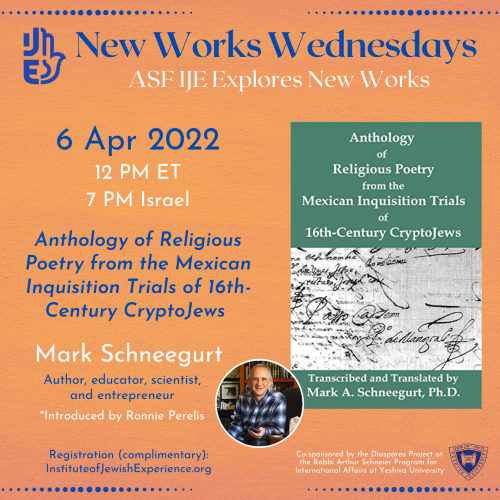
About the book:
A century after being expelled from Portugal, cryptoJews in Mexico, false converts to Christianity, could not speak of their beliefs for fear of becoming embroiled in the imprisonment, torture, and death in flames that characterized the Inquisition. Without written texts, the Jewish liturgy lost, clans of cryptoJews created a unique body of religious poetry, connecting them to the Laws of Moses, seeking redemption from sin, or hoping for an escape from their embittered lives. The Carvajal clan was led by Luis el Mozo, an alumbrado, a mystic, and his Judaizing sisters. Once discovered to be secretly practicing Judaism, years of suffering at the hands of the Inquisitors were meticulously recorded in the transcripts of their long demeaning trials. The Carvajal’s friends, spouses, children and grandchildren were implicated as Judaizers, with many being reconciled by the Church to secular authorities to be burned alive at massive public ceremonies. The burning of Luis and his sisters was the main attraction for cheering crowds at the auto de fé of 1596 in Mexico City. The cruelty of the Inquisitors was matched by their attention to legal detail and testimonies made at trial. Buried within thousands of pages of transcripts, hiding in library special collections of rare books around the world are the only remnants of the religious poetry that sustained cryptoJews hiding in Mexico. Anthology uncovers these hidden treasures!
About the author:
Mark A. Schneegurt is an author, educator, scientist, and entrepreneur. His books range from scholarly works on science, religion, and literature to popular books on The Beatles. He has authored 80+ publications and has made 200+ public presentations of his works.
Sponsorship opportunities available:
info@americansephardi.org
===
The ASF Institute of Jewish Experience presents:
“Why is the Sephardi Haggadah different from all other Haggadot?”
Let us explore the fine details of different geographic Minhagim in the Sephardi world with Rabbi Albert Gabbai.
This event will be a hybrid event.
For those interested in joining in-person at Congregation Mikveh Israel in Philadelphia, please contact us at drora@americansephardi.org
Sunday, 10 April at 12:00PM EST
(Ticket: $10)
Sign-up Now!
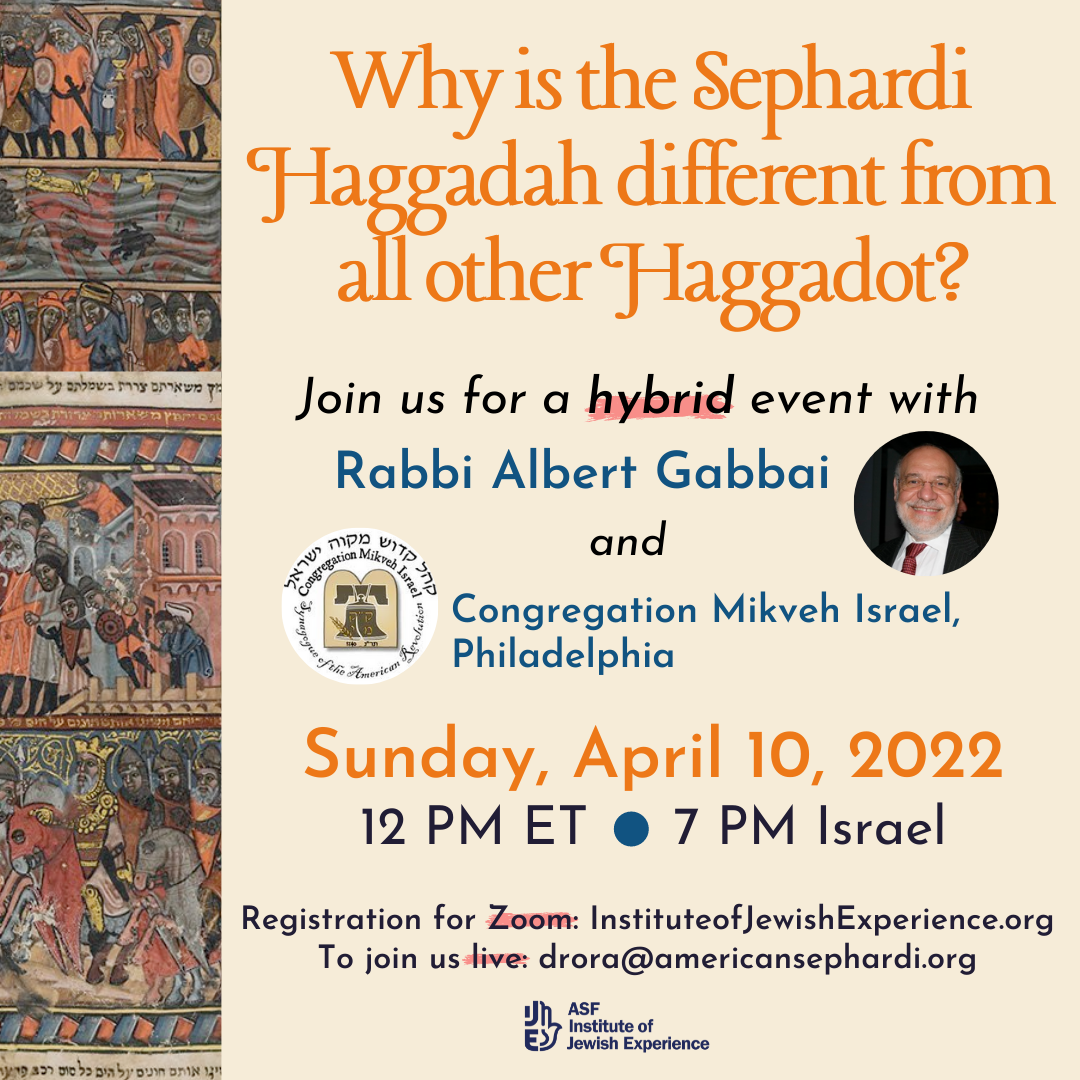
Sponsorship opportunities available:
info@americansephardi.org
===
The Department of Anthropology & Archeology at the University of Calgary, Schusterman Center for Israel Studies, Brandeis University and Belzberg Program in Israel Studies, University of Calgary, & the American Sephardi Federation present:
Sephardi Thought and Modernity 2022 Webinar Series
Continuity and Rupture in Sephardi Modernities
(Second Edition)
On Wednesdays at 1:00PM EST
(10am Pacific / 1pm Eastern / 6pm UK / 8pm Israel / 9:30pm Iran)
(Complimentary RSVP)
13 April
(10am Pacific / 1pm Eastern / 5pm UK / 7pm Israel / 8:30pm Iran – note time – US Daylight Savings)
Julia Philips Cohen (Vanderbilt University) and Devi Mays (University of Michigan) Middle Eastern and North African Jews in Paris: A Forgotten Chapter
11 May
(10am Pacific / 1pm Eastern / 5pm UK / 7pm Israel / 8:30pm Iran – note time – US Daylight Savings)
Vanessa Paloma Elbaz (University of Cambridge) Rhizomic networks of unruptured continuity from 16th c. Italy to 21st c. Casablanca: Music, Power, Mysticism and Neo-Platonism

In this second edition of the Sephardi Thought and Modernity Series we will focus on the question of continuity and rupture as a way to deepen our dialogue about the different forms that modernity has adopted throughout Sephardi history. We will discuss questions such as the meaning of the concept of “modernity” in non-European contexts such as the Levant and/or the Arab world. We will explore how non-European Jewish societies developed ways of life and practices that synthesized tradition, change and cultural diversity throughout time. We will delve into Sephardi intellectual life, cosmopolitanism, cultural belongings, language, translation and mobility.

===
Holocaust Memorial and Tolerance Center of Nassau County presents:
New Manhattan Sinfonietta
Hymns from Auschwitz: A Tribute to Viktor Ullman and Michel Assael
In honor of Yom HaShoah, join us for a never-before-seen musical performance in memory of two Holocaust victims; one who survived; and one who was murdered.
This event will honor ASF’s distinguished Board Member Martin Elias with music inspired by a Holocaust survivor’s story to be performed on this night for the first time ever.
Renan Koen, piano and Celesta Gürer Aykal, conductor.
Featuring Hazan Rabbi Nesim Elnecavé and Ilker Nahmias
Wednesday, 20 April at 8:00PM EST
See sponsorship opportunities here!

New Manhattan Sinfonietta brings together soulful premieres. This meaningful concert includes “Hymns from Auschwitz” featuring hazans and a piano orchestral piece by Elcil Gürel Göçtü, a young student composer who worked with Renan Koen on her March of the Music initiative. The concert also includes Piano Concerto No. 24 in C Minor, K. 491 by W.A. Mozart, which Renan Koen will perform in memoriam of Viktor Ullmann. The performance will conclude with the debut of the Auschwitz Symphonic Poem written by Holocaust survivor Michel Assael. This poem was locked away and ultimately found by Dr. Joe Halio through his passionate research, and Renan Koen assisted in bringing this masterpiece to life.
This moving musical score was written by Michel Assael, a Jewish musician and composer from Salonika, Greece. After surviving Auschwitz, Assael wrote this piece in memory of all that was lost. The piece was written in 1947, but has never been performed. It has recently been rediscovered and will be given its debut performance at this not-to-be missed concert.
This event is also in memory of Viktor Ullman, a Silesian-born Austrian and renowned composer, and conductor who was sent to Terezin where he organized concerts and performed during the war. Ullman was ultimately deported to Auschwitz and was killed in the gas chambers.
Sponsorship opportunities available:
info@americansephardi.org
===
The Greek Jewish & Sephardic Young Professionals Network in partnership with the Association of Friends of Greek Jewry present:
Special Young Professionals Tour of Jewish Greece
(Summer 2022)
Join to trace the roots of our families, visit the beautiful cities of Thessaloniki (Salonika), Veroia, Kastoria, Ioannina, Athens, and Rhodes, and connect with other young Jews in Greece.
Check out the full itinerary here!

For more information email GreekJewishYPN@gmail.com